英语新概念2 Lesson26 The best art critics 同步教学课件(共63张PPT)
文档属性
| 名称 | 英语新概念2 Lesson26 The best art critics 同步教学课件(共63张PPT) | 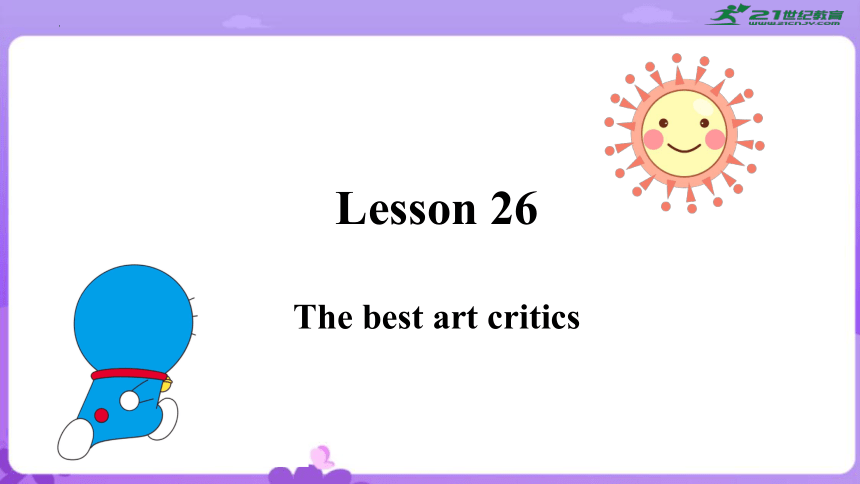 | |
| 格式 | pptx | ||
| 文件大小 | 4.0MB | ||
| 资源类型 | 试卷 | ||
| 版本资源 | 新概念英语 | ||
| 科目 | 英语 | ||
| 更新时间 | 2023-05-12 10:00:17 | ||
图片预览

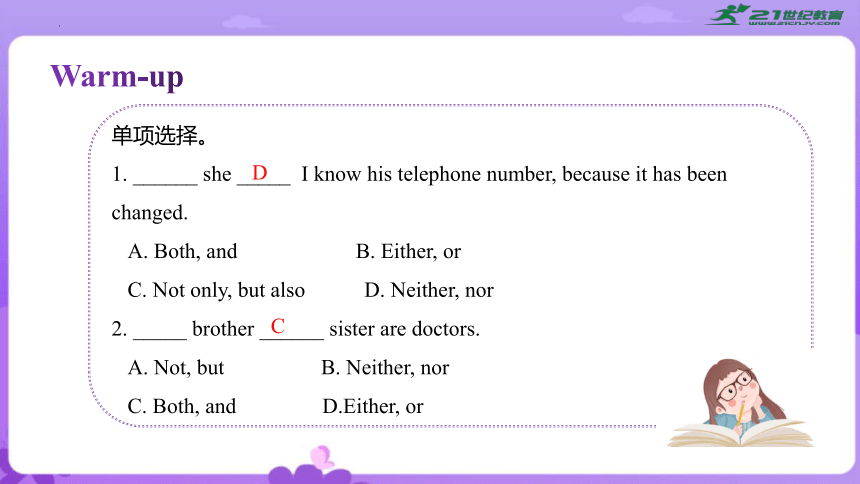
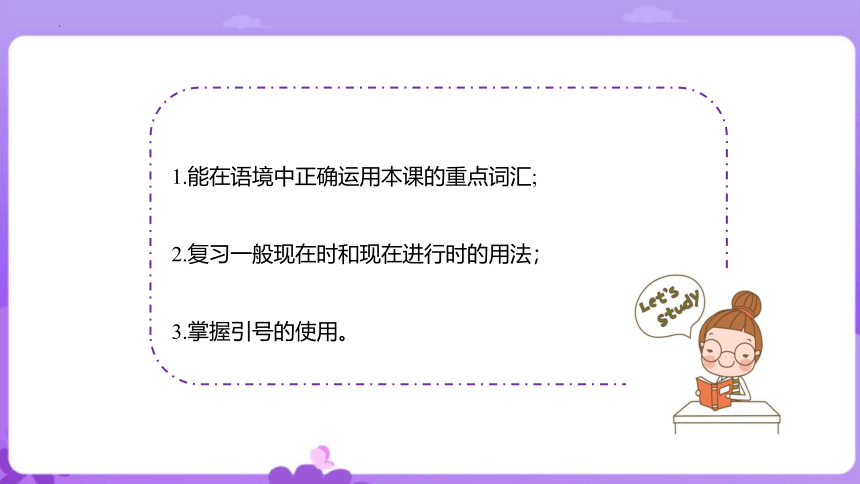
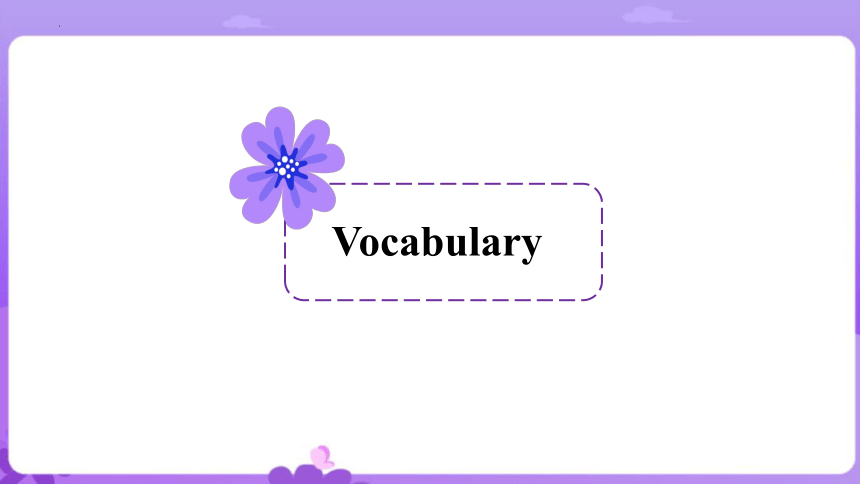
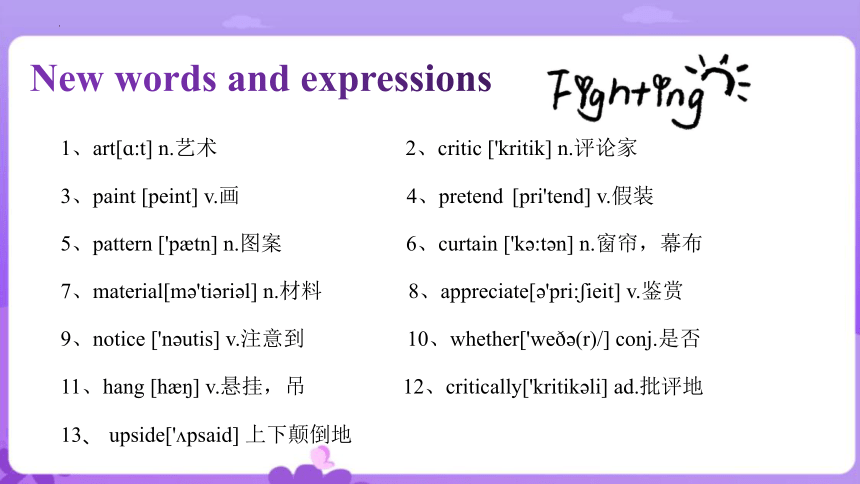
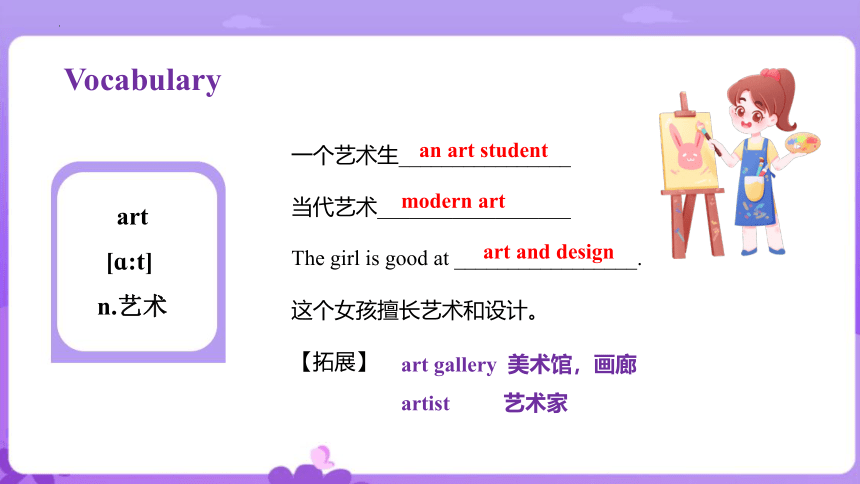
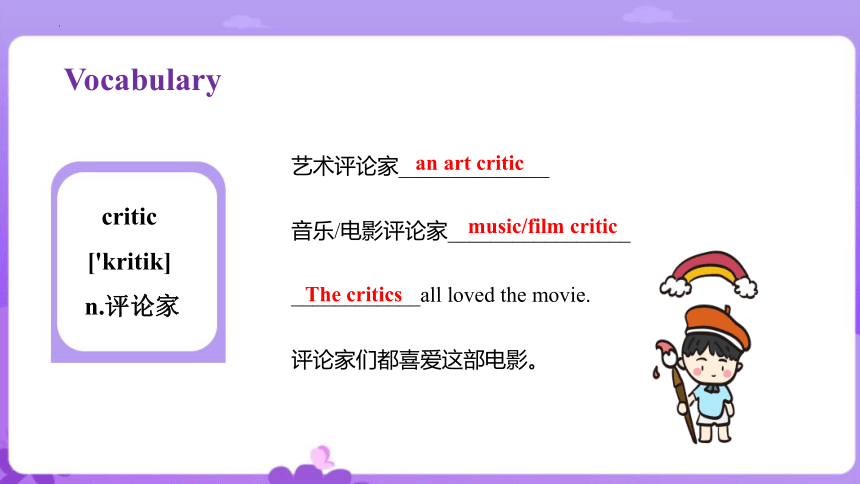
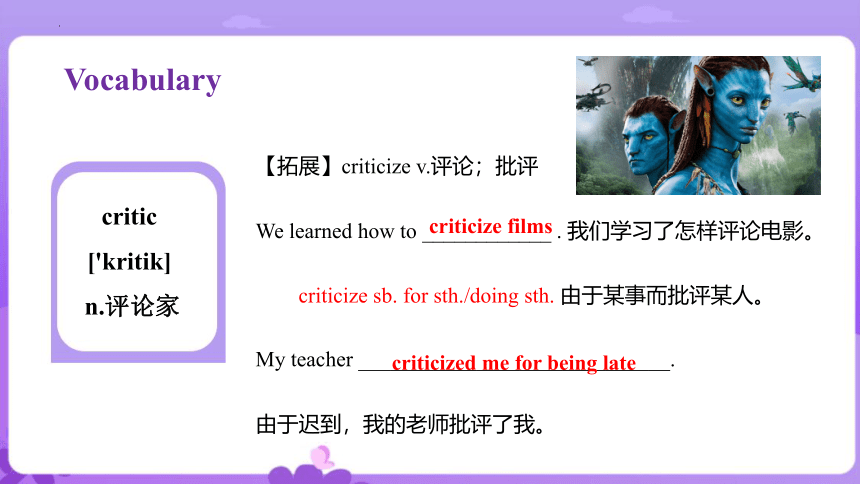
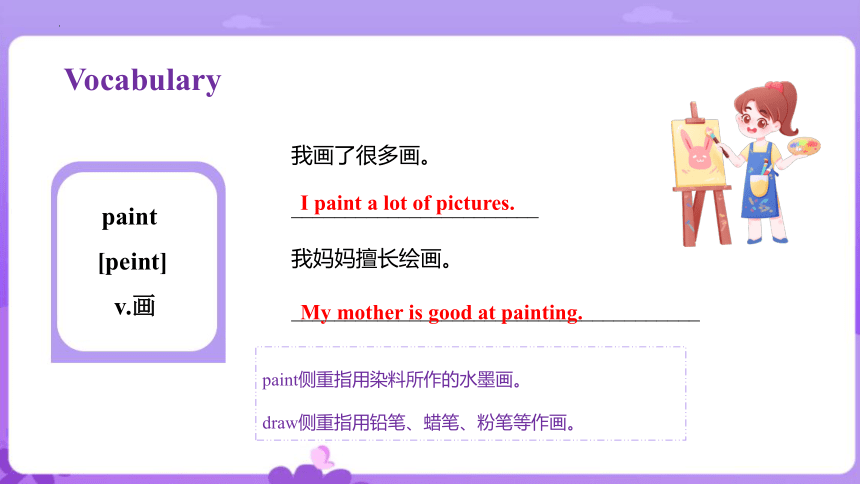
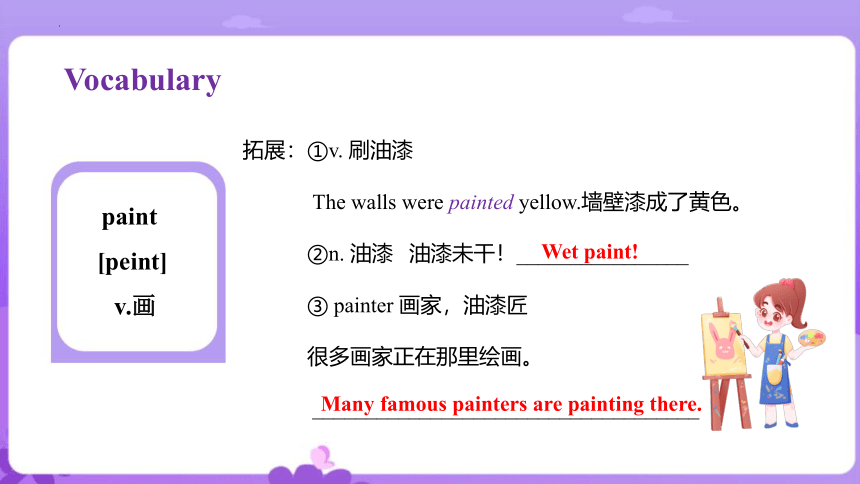
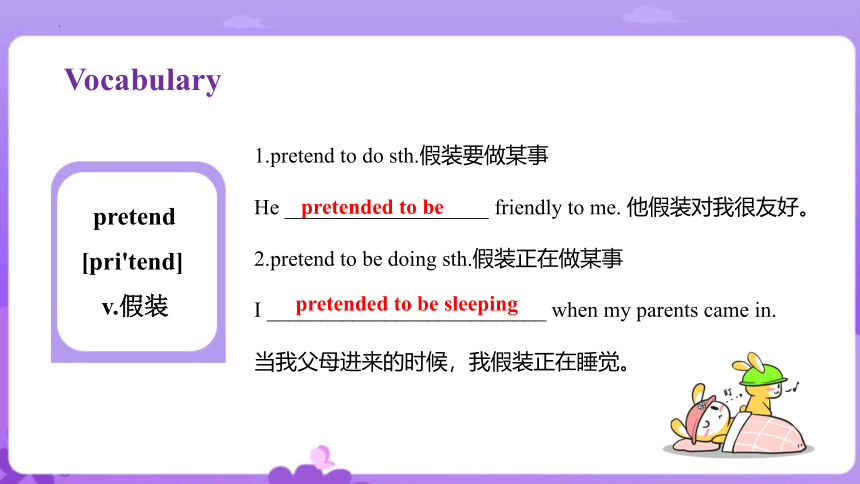

文档简介
(共63张PPT)
Lesson 26
The best art critics
单项选择。
1. ______ she _____ I know his telephone number, because it has been changed.
A. Both, and B. Either, or
C. Not only, but also D. Neither, nor
2. _____ brother ______ sister are doctors.
A. Not, but B. Neither, nor
C. Both, and D.Either, or
Warm-up
D
C
1.能在语境中正确运用本课的重点词汇;
2.复习一般现在时和现在进行时的用法;
3.掌握引号的使用。
Vocabulary
New words and expressions
1、art[ɑ:t] n.艺术 2、critic ['kritik] n.评论家
3、paint [peint] v.画 4、pretend [pri'tend] v.假装
5、pattern ['p tn] n.图案 6、curtain ['k :t n] n.窗帘,幕布
7、material[m 'ti ri l] n.材料 8、appreciate[ 'pri: ieit] v.鉴赏
9、notice ['n utis] v.注意到 10、whether['we (r)/] conj.是否
11、hang [h ] v.悬挂,吊 12、critically['kritik li] ad.批评地
13、 upside[' psaid] 上下颠倒地
一个艺术生________________
当代艺术__________________
The girl is good at _________________.
这个女孩擅长艺术和设计。
【拓展】
art
[ɑ:t]
n.艺术
Vocabulary
an art student
modern art
art and design
art gallery 美术馆,画廊
artist 艺术家
艺术评论家______________
音乐/电影评论家_________________
____________all loved the movie.
评论家们都喜爱这部电影。
critic
['kritik]
n.评论家
Vocabulary
an art critic
music/film critic
The critics
【拓展】criticize v.评论;批评
We learned how to ____________ . 我们学习了怎样评论电影。
criticize sb. for sth./doing sth. 由于某事而批评某人。
My teacher _____________________________.
由于迟到,我的老师批评了我。
critic
['kritik]
n.评论家
Vocabulary
criticize films
criticized me for being late
我画了很多画。
_______________________
我妈妈擅长绘画。
______________________________________
paint
[peint]
v.画
Vocabulary
I paint a lot of pictures.
My mother is good at painting.
paint侧重指用染料所作的水墨画。
draw侧重指用铅笔、蜡笔、粉笔等作画。
拓展:①v. 刷油漆
The walls were painted yellow.墙壁漆成了黄色。
②n. 油漆 油漆未干!________________
③ painter 画家,油漆匠
很多画家正在那里绘画。
____________________________________
paint
[peint]
v.画
Vocabulary
Wet paint!
Many famous painters are painting there.
1.pretend to do sth.假装要做某事
He ___________________ friendly to me. 他假装对我很友好。
2.pretend to be doing sth.假装正在做某事
I __________________________ when my parents came in.
当我父母进来的时候,我假装正在睡觉。
pretend
[pri'tend]
v.假装
Vocabulary
pretended to be
pretended to be sleeping
3.pretend to have done假装做过某事
He ________________________ abroad.他假装去过国外。
4.pretend +that 从句 假装…
I ______________ things are really okay.我假装一切顺利。
pretend
[pri'tend]
v.假装
Vocabulary
pretended to have been
pretend that
美丽的图案________________
例:This cloth has a pattern of blue and white squares.
这种布有蓝白格子的图案。
pattern
['p tn]
n.图案
Vocabulary
pretty pattern
拓展:1.模式;方式 __________________ 睡眠模式
2.范例;典范;榜样
This system __________________________ to follow.
(set the pattern for sb.)
这个系统堪为他人仿效的典范。
3.模型;底样;纸样
She bought a dress pattern and some material.
她买了一幅衣服纸样和一些衣料。
pattern
['p tn]
n.图案
Vocabulary
sleeping pattern
sets the pattern for others
拉上窗帘 _____________________________
It was ten in the morning but the curtains _________________________________.
已是早上10点钟了,可窗帘还拉着。
【拓展】
还可表示“(舞台上的)幕,幕布,帷幕”
We left just before _______________________ .
我们刚好在演出结束前离开。
curtain
['k :t n]
n.窗帘,幕布
Vocabulary
draw/pull/close the curtains
were still drawn/closed.
the final curtain
1.cn.材料;原料 ______________________ 教材
2.cn.(某一活动所需的)材料
_________________ 建筑材料
3.un.素材;用以创作的材料(或构想)
She's collecting material for her latest novel.
她在为其最新的小说收集素材。
material
[m 'ti ri l]
n.材料
Vocabulary
teaching materials
building materials
【例】Anyone can appreciate our music.
任何人都能欣赏我们的音乐。
Do you know how to_________________
你知道如何鉴赏酒吗?
appreciate
[ 'pri: ieit]
v.鉴赏
Vocabulary
appreciate wine
【拓展】1.欣赏,赏识
I am really happy because my work is appreciated.
我真的很开心因为我的工作得到了赏识。
2.感谢;感激
I deeply appreciate __________. 我非常感激你的帮助。
3.增值;升值
These houses __________________ in several years.
这些房子若干年后会升值。
appreciate
[ 'pri: ieit]
v.鉴赏
Vocabulary
your help
will appreciate
【短语】注意到某人正在做某事
______________________
Do you notice a man ________________________
你注意到一个人从窗子里跳了出来吗?
____________________________________
我注意到一个女孩站在门口。
notice
['n utis]
v.注意到
Vocabulary
notice sb. doing sth.
jumping out of the window
I noticed a girl standing at the door.
notice +从句
He noticed that there was a black cat in the box.
他注意到箱子里有一只黑猫。
I didn't notice when he left.
我没有注意到他是什么时候离开的。
______________________________________
你注意到是谁把他带回家的吗?
notice
['n utis]
v.注意到
Vocabulary
Do you notice who took him home
拓展:n.注意【U.】
come to one's notice 引起某人的注意
This letter ___________________ 这封信引起了我的注意。
2.(提前)通知【U.】
He came to my office________________.
他没有提前通知就来我办公室了
3.通知,布告,告示【C.】
He_________________ on the wall. 他在墙上贴了一则通知。
notice
['n utis]
v.注意到
Vocabulary
came to my notice.
without notice
put up a notice
whether和if都可以表示“是否”,引导宾语从句。一般情况下可以互换使用。
You may wonder ______________________.
你可能想知道它是否是真的。
只能用whether的情况:
1.当引导的从句中出现or not时,通常用whether,而不用if。
I want to know whether you will come to my party or not tomorrow. 我想知道你明天是否来参加我的聚会。
whether
['we (r)]
conj.是否
Vocabulary
whether/if it is true
2.动词不定式to do sth.结构前只能用whether
Have you decided whether to go abroad yet
你决定好是否要出国了吗?
3.介词后只能用whether
We're discussing the problem of whether to go abroad.
我们还在讨论是否要出国的问题。
whether
['we (r)]
conj.是否
Vocabulary
hang 表示“悬挂”时,其过去时和过去分词时hung,hung。
___________________________挂一幅画在墙上
__________________ on the hook.把你的大衣挂在衣钩上。
拓展:
表示“绞刑”时,过去时和过去分词时hanged, hanged
He was the last man ______________ for murder in this country.
他是这个国家最后一个被处以绞刑的谋杀犯。
hang
[h ]
v.悬挂,吊
Vocabulary
hang a picture on the wall
to be hanged
Hang your coat (up)
He examined the quality of the furniture critically.
他以挑剔的目光审视家具的质量.
_____________________________ 迈克挑剔地打量着她。
critical adj.批评的,批判的
We should develop our ____________________.
我们应该培养我们批判的能力。
critically
['kritik li]
ad.批评地
Vocabulary
Mike looked at her critically.
critical ability.
Everything he saw was___________ .
他看到的一切都是颠倒的。
The painting was ___________________ . 油画挂倒了。
______________________________________
船在底朝天漂浮在湖面上。
upside-down
[' psaid]
上下颠倒地
Vocabulary
upside down
The ship floated upside down on the lake.
hung upside down
1、tell a lie 说谎 2、tell true 说真话
3、critical 批评(adj.) 4、criticise 批评(n.)
5、criticism 评论(n.) 6、notice 告示
7、not but 不是而是 8、leave me alone 别理我
Words & Phrases
9、art student 学艺术的学生 10、pretend to do 假装做某事
11、appreciate doing sth感激某事 12、notice doing sth 正在做某事
13、 notice do sth 做了某事 14、pretty good 相当好
15、hang –hanged 吊死,绞死
Words & Phrases
试一试:中译英
1.我注意到他正在找他的橡皮。
_____________________________________________
2.我想知道他是否想要把画挂在墙上。
___________________________________________________
3. 当老师走进教室的时候,他假装正在认真看书。
_____________________________________________
____________________________
I noticed him looking for his eraser.
I wondered whether he wanted to hang the painting on the wall.
He pretended to be reading the book carefully when the teacher came into the calssroom.
Text
I am an art student and I paint a lot of pictures. Many people pretend that they understand modern art.They always tell you what a picture is 'about'. Of course, many pictures arc not 'about' anything. They are just pretty patterns. We like them in the same way that we like pretty curtain material. I think that young children often appreciate modern pictures better than anyone else. They notice more. My sister is only seven, but she always tells me whether my pictures are good or not. She came into my room yesterday.'
‘What are you doing ’ she asked.
‘I'm hanging this picture on the wall,”’I answered. 'It's a new one.Do you like it '
She looked at it critically for a moment.' It's all right,' she said, 'but isn't it upside-down '
I looked at it again. She was right! It was!
I am an art student and I paint a lot of pictures. Many people pretend that they understand modern art.They always tell you what a picture is 'about'. Of course, many pictures arc not 'about' anything. They are just pretty patterns. We like them in the same way that we like pretty curtain material. I think that young children often appreciate modern pictures better than anyone else. They notice more. My sister is only seven, but she always tells me whether my pictures are good or not. She came into my room yesterday.'
‘What are you doing ’ she asked.
‘I'm hanging this picture on the wall,’I answered. 'It's a new one.Do you like it '
She looked at it critically for a moment.' It's all right,' she said, 'but isn't it upside-down '
I looked at it again. She was right! It was!
I am an art student and I paint a lot of pictures.
有些表示状态和感觉的动词常用于一般现在时,而不用于进行时。
如: appear, appreciate, believe, feel, look like, like,forget, remember等。
People like working with him. 人们喜欢和他一起工作。
I believe that sugar can make us fat. 我相信糖能使我们变胖。
They are just pretty patterns.
just 在此处指“只是,仅仅(是)”
It was just a wrong number.
just 另一个意思是“刚才,正好,正是”
It’s just six o’clock.
I’ve just heard the news.
We like them in the same way that we like pretty curtain material.
in the same way that =as… 正如……一样
The son walked in the same way that/as his father walked.
I love you in the same way that I love my father.
I love you just in the same way that I love money.
in a way 以某种方式
漂亮的窗帘布
We like them in the same way that we like pretty curtain material.
in the same way that/as:像……一样,正如……一样。
用来表示比较。
I am crazy about American movies in the same way that you like baseball.
我对美国电影着迷就像你喜欢棒球一样。
I think that young children often appreciate modern pictures better than anyone else.
1)else 跟在 anyone,anything 等不定代词的后面,表示“另外/加、其它/他的、不同的”,else 也可跟疑问代词连用,如 who else,what else
I can find nothing else here excep an old dictionary.
They can appreciate modern arts best.
I think that young children often appreciate modern pictures better than anyone else.
better than anyone else 比其他任何人(表示最高级的含义)
用比较级表示最高级:
The teacher is the tallest.
The teacher is taller than anyone else. (“else”不能少, 把主语从“anyone”中排除)
The book is more expensive than anything else.
I think that young children often appreciate modern pictures better than anyone else.
3) other作为“其他的”讲时,往往修饰名词,放在名词前面。
the others指“已提到过的其余部分”。
He prefers the coffee to other kinds.比起来其他的种类,他更喜欢这种咖啡。
Some children are reading, the others are doing exercises.
一些孩子在看书,其他的全部都在做练习。
My sister is only seven, but she always tells me whether my pictures are good or not.
连接词 whether…or not 可以表示选择:
I don’t know whether you are interested (in it) or not.
You must help him, whether you like him or not.
不管你是否喜欢他,你(都)必须帮助他。
'I'm hanging this picture on the wall,' I answered.
the windows in the wall /picture on the wall
注意介词的不同
'It's all right,' she said, 'but isn't it upside down '
Isn’t it upside down =It’s upside down. 否定疑问句,没有否定的意思,起肯定作用,起强调作用,表达一种情绪
Aren't you lucky 你真幸运
Isn't it a boy
1. The writer thinks ______________
(a) you can't always 'explain' modern pictures
(b) you can always 'explain'modern pictures
(c)modern pictures are always about something
(d)we can use modern pictures as curtain material
2. The writer's sister ________
(a)paints pictures
(b)didn't like her brother's picture
(c) didn't see her brother's picture
(d) noticed that her brother had made a mistake
A
D
Questions:
Grammar
一般现在时
Grammar
一般现在时可以用于表述现在的特征或状态,也经常用于表述经常性的或习惯性的动作,或带有普遍性的情况,频度副词可有可无,一般现在时还用于表示普遍性真理。
一般现在时
Grammar
和人的情绪相连, 跟人的状态相连, 跟人的思维活动相连的动词都不用进行时态,而用于一般现在时,这些动词是:appear,appreciate,be,believe,feel,find,forget,hear,know,like,look like,notice,remember,
resemble,see,think,understand 等等
Grammar
1.I am having breakfast. Do you always get up so late
我正在吃早餐。你总是起得这么晚吗?
前一句用的是现在进行时。表示主语正在做某事。(be+v.ing)
后一句用的是一般现在时。always体现了这是经常性、习惯性发生的动作。符合一般现在时的用法。
2.The earth goes round the sun.地球围绕太阳转。
3.The sun rises in the east and sets in the west.太阳从东方升起,在西方落下。
这两句都用的是一般现在时。用来描述客观真理。
The water boils at 100 °℃.水在100摄氏度就会沸腾。
Grammar
总结:1.现在进行时
用法:用于描述正在发生在动作。
结构:be+V.ing
2.一般现在时用法:1.用于描述经常性、习惯性的动作。
2.用于描述客观真理。
结构: 1.主语+V.(有单数变化)+其它
主语+be(有单复数变化)+其它
Grammar
Speech marks 引号
Grammar
在书面语会话中,用引号(单引号或双引号)把实际的对话括起来。引号在英文当中第一次出现是单引号, 第二次出现是双引号, 英文当中的书名号用引号来替代
注意事项 :
① 引号位于一行之上, 它们应在句尾其他标点符号—如逗号、句号、问号—之外.
② 引语的第一个词以大写字母开头.
③ 在 said, asked 等词后面用逗号, 只有当它们位于句尾时, 才在它们的后面用句号.
④ 当 said, asked 等词置于引语之间时, 句子的后半部分以小写字母开始.
⑤ 当一个新的说话人开始讲话时, 要另起一个段落.
Grammar
在书面会话中,我们用引号(单引号或双引号)把实际的对话括起来。细读以下例句:
'What are you doing 'she asked.
'I'm hanging this picture on the wall,' I answered. 'It's a new one. Do you like it '
She looked at it critically for a moment. 'It's all right,' she said, 'but isn't it upside down '
1. Who _______ over there now
A.singing B.are singing C. is singing D.sing
2.On Sundays he sometimes ________ his clothes and sometimes ______ some shopping.
A. wash, do B. is washing, is doing C. washes, does
Grammar
C
C
Practice
【根据括号中所给的汉语提示写出相应的英语单词,并注意运用其正确形式】
1.The little boy_____________ (假装) to be ill so that he could stay in bed.
2.I _________ (注意到) that the leaves of the trees had turned green.
3.I wonder _________ (是否) he will go there with us.
4.Sophie is ___________ (悬挂) the picture on the wall.
5.He looked at my painting __________ (批评地) for a while but said nothing.
【答案】
1.pretended
2.noticed
3.whether/if
4.hanging
5.critically
【句型转换】
1. When does the train arrive Please tell me.(改为宾语从句)
Please tell me _________ ________ ________ _________ .
2. What does he do Do you know (改为宾语从句)
Do you know _______ he ________ .
3. Do they want fried chicken He asked the boys. (改为宾语从句)
He asked the boys _________ they _______ fried chicken.
when the train arrives
what does
if/weather wanted
单项选择
1.When his mother came in,the boy pretended _________ to sleep.
A.going B.to be gone C.to go D.gone
2.Have you ever _______ that girl at the gate of our school
A.noticed B.caught C.realized D.listened
3.I really appreciate that all of you ________ a great party for my birthday!
A.making B.to make C.made D.having made
C
A
C
4.She told me the sun ______ in the east.
A.rise B.rose C.rises D.had risen
5.He asked _______ or not I wanted to go there by train.
A.if B.which C.what D.whether
6.Does the American spell this word in the same way ______ the British
A.as B.that C.like D.which
7.I can't understand ______ the boy alone.
A.why she left B.why did she leave C.why had she left D.why she had left
C
D
A
A
8.The worker looked for jobs in New York for months, _____ he could not find any work.
A.and B.yet C.or D.and but
9.-Is this your coat -No. Mine ______ behind the door.
A.is hanged B.hanged C.hung D. is hanging
10.I don't know if he tomorrow. If he _____, I'll meet him.
A.will come; comes B.comes; comes
C.will come; wil come D.comes; will come
B
D
A
【把下列句子翻译成英语】
1.老师进来的时候,他假装正在看书。(pretend)
2.你能告诉我其他还有谁去参加聚会吗? (else)
3.我真的非常感激你来看我。(appreciate)
4,我注意到妈妈的头发已经变白了。(notice)
5,杯子碎了,因为他把它们放颠倒了。(upside down)
【把下列句子翻译成英语】
1.When the teacher came in, he pretended to be reading.
2.Can you tell me who else is going to attend the party
3.I really appreciate your visit.
4.I noticed that my mother's hair had turned white.
5.The glasses are all broken because he has put them upside down.
Lesson 26
art, critic, paint, pretend, pattern, curtain, material, appreciate, notice, whether, hang, critically, upside down
一般现在时和现在进行时复习;
引号的用法
Lesson 26
The best art critics
单项选择。
1. ______ she _____ I know his telephone number, because it has been changed.
A. Both, and B. Either, or
C. Not only, but also D. Neither, nor
2. _____ brother ______ sister are doctors.
A. Not, but B. Neither, nor
C. Both, and D.Either, or
Warm-up
D
C
1.能在语境中正确运用本课的重点词汇;
2.复习一般现在时和现在进行时的用法;
3.掌握引号的使用。
Vocabulary
New words and expressions
1、art[ɑ:t] n.艺术 2、critic ['kritik] n.评论家
3、paint [peint] v.画 4、pretend [pri'tend] v.假装
5、pattern ['p tn] n.图案 6、curtain ['k :t n] n.窗帘,幕布
7、material[m 'ti ri l] n.材料 8、appreciate[ 'pri: ieit] v.鉴赏
9、notice ['n utis] v.注意到 10、whether['we (r)/] conj.是否
11、hang [h ] v.悬挂,吊 12、critically['kritik li] ad.批评地
13、 upside[' psaid] 上下颠倒地
一个艺术生________________
当代艺术__________________
The girl is good at _________________.
这个女孩擅长艺术和设计。
【拓展】
art
[ɑ:t]
n.艺术
Vocabulary
an art student
modern art
art and design
art gallery 美术馆,画廊
artist 艺术家
艺术评论家______________
音乐/电影评论家_________________
____________all loved the movie.
评论家们都喜爱这部电影。
critic
['kritik]
n.评论家
Vocabulary
an art critic
music/film critic
The critics
【拓展】criticize v.评论;批评
We learned how to ____________ . 我们学习了怎样评论电影。
criticize sb. for sth./doing sth. 由于某事而批评某人。
My teacher _____________________________.
由于迟到,我的老师批评了我。
critic
['kritik]
n.评论家
Vocabulary
criticize films
criticized me for being late
我画了很多画。
_______________________
我妈妈擅长绘画。
______________________________________
paint
[peint]
v.画
Vocabulary
I paint a lot of pictures.
My mother is good at painting.
paint侧重指用染料所作的水墨画。
draw侧重指用铅笔、蜡笔、粉笔等作画。
拓展:①v. 刷油漆
The walls were painted yellow.墙壁漆成了黄色。
②n. 油漆 油漆未干!________________
③ painter 画家,油漆匠
很多画家正在那里绘画。
____________________________________
paint
[peint]
v.画
Vocabulary
Wet paint!
Many famous painters are painting there.
1.pretend to do sth.假装要做某事
He ___________________ friendly to me. 他假装对我很友好。
2.pretend to be doing sth.假装正在做某事
I __________________________ when my parents came in.
当我父母进来的时候,我假装正在睡觉。
pretend
[pri'tend]
v.假装
Vocabulary
pretended to be
pretended to be sleeping
3.pretend to have done假装做过某事
He ________________________ abroad.他假装去过国外。
4.pretend +that 从句 假装…
I ______________ things are really okay.我假装一切顺利。
pretend
[pri'tend]
v.假装
Vocabulary
pretended to have been
pretend that
美丽的图案________________
例:This cloth has a pattern of blue and white squares.
这种布有蓝白格子的图案。
pattern
['p tn]
n.图案
Vocabulary
pretty pattern
拓展:1.模式;方式 __________________ 睡眠模式
2.范例;典范;榜样
This system __________________________ to follow.
(set the pattern for sb.)
这个系统堪为他人仿效的典范。
3.模型;底样;纸样
She bought a dress pattern and some material.
她买了一幅衣服纸样和一些衣料。
pattern
['p tn]
n.图案
Vocabulary
sleeping pattern
sets the pattern for others
拉上窗帘 _____________________________
It was ten in the morning but the curtains _________________________________.
已是早上10点钟了,可窗帘还拉着。
【拓展】
还可表示“(舞台上的)幕,幕布,帷幕”
We left just before _______________________ .
我们刚好在演出结束前离开。
curtain
['k :t n]
n.窗帘,幕布
Vocabulary
draw/pull/close the curtains
were still drawn/closed.
the final curtain
1.cn.材料;原料 ______________________ 教材
2.cn.(某一活动所需的)材料
_________________ 建筑材料
3.un.素材;用以创作的材料(或构想)
She's collecting material for her latest novel.
她在为其最新的小说收集素材。
material
[m 'ti ri l]
n.材料
Vocabulary
teaching materials
building materials
【例】Anyone can appreciate our music.
任何人都能欣赏我们的音乐。
Do you know how to_________________
你知道如何鉴赏酒吗?
appreciate
[ 'pri: ieit]
v.鉴赏
Vocabulary
appreciate wine
【拓展】1.欣赏,赏识
I am really happy because my work is appreciated.
我真的很开心因为我的工作得到了赏识。
2.感谢;感激
I deeply appreciate __________. 我非常感激你的帮助。
3.增值;升值
These houses __________________ in several years.
这些房子若干年后会升值。
appreciate
[ 'pri: ieit]
v.鉴赏
Vocabulary
your help
will appreciate
【短语】注意到某人正在做某事
______________________
Do you notice a man ________________________
你注意到一个人从窗子里跳了出来吗?
____________________________________
我注意到一个女孩站在门口。
notice
['n utis]
v.注意到
Vocabulary
notice sb. doing sth.
jumping out of the window
I noticed a girl standing at the door.
notice +从句
He noticed that there was a black cat in the box.
他注意到箱子里有一只黑猫。
I didn't notice when he left.
我没有注意到他是什么时候离开的。
______________________________________
你注意到是谁把他带回家的吗?
notice
['n utis]
v.注意到
Vocabulary
Do you notice who took him home
拓展:n.注意【U.】
come to one's notice 引起某人的注意
This letter ___________________ 这封信引起了我的注意。
2.(提前)通知【U.】
He came to my office________________.
他没有提前通知就来我办公室了
3.通知,布告,告示【C.】
He_________________ on the wall. 他在墙上贴了一则通知。
notice
['n utis]
v.注意到
Vocabulary
came to my notice.
without notice
put up a notice
whether和if都可以表示“是否”,引导宾语从句。一般情况下可以互换使用。
You may wonder ______________________.
你可能想知道它是否是真的。
只能用whether的情况:
1.当引导的从句中出现or not时,通常用whether,而不用if。
I want to know whether you will come to my party or not tomorrow. 我想知道你明天是否来参加我的聚会。
whether
['we (r)]
conj.是否
Vocabulary
whether/if it is true
2.动词不定式to do sth.结构前只能用whether
Have you decided whether to go abroad yet
你决定好是否要出国了吗?
3.介词后只能用whether
We're discussing the problem of whether to go abroad.
我们还在讨论是否要出国的问题。
whether
['we (r)]
conj.是否
Vocabulary
hang 表示“悬挂”时,其过去时和过去分词时hung,hung。
___________________________挂一幅画在墙上
__________________ on the hook.把你的大衣挂在衣钩上。
拓展:
表示“绞刑”时,过去时和过去分词时hanged, hanged
He was the last man ______________ for murder in this country.
他是这个国家最后一个被处以绞刑的谋杀犯。
hang
[h ]
v.悬挂,吊
Vocabulary
hang a picture on the wall
to be hanged
Hang your coat (up)
He examined the quality of the furniture critically.
他以挑剔的目光审视家具的质量.
_____________________________ 迈克挑剔地打量着她。
critical adj.批评的,批判的
We should develop our ____________________.
我们应该培养我们批判的能力。
critically
['kritik li]
ad.批评地
Vocabulary
Mike looked at her critically.
critical ability.
Everything he saw was___________ .
他看到的一切都是颠倒的。
The painting was ___________________ . 油画挂倒了。
______________________________________
船在底朝天漂浮在湖面上。
upside-down
[' psaid]
上下颠倒地
Vocabulary
upside down
The ship floated upside down on the lake.
hung upside down
1、tell a lie 说谎 2、tell true 说真话
3、critical 批评(adj.) 4、criticise 批评(n.)
5、criticism 评论(n.) 6、notice 告示
7、not but 不是而是 8、leave me alone 别理我
Words & Phrases
9、art student 学艺术的学生 10、pretend to do 假装做某事
11、appreciate doing sth感激某事 12、notice doing sth 正在做某事
13、 notice do sth 做了某事 14、pretty good 相当好
15、hang –hanged 吊死,绞死
Words & Phrases
试一试:中译英
1.我注意到他正在找他的橡皮。
_____________________________________________
2.我想知道他是否想要把画挂在墙上。
___________________________________________________
3. 当老师走进教室的时候,他假装正在认真看书。
_____________________________________________
____________________________
I noticed him looking for his eraser.
I wondered whether he wanted to hang the painting on the wall.
He pretended to be reading the book carefully when the teacher came into the calssroom.
Text
I am an art student and I paint a lot of pictures. Many people pretend that they understand modern art.They always tell you what a picture is 'about'. Of course, many pictures arc not 'about' anything. They are just pretty patterns. We like them in the same way that we like pretty curtain material. I think that young children often appreciate modern pictures better than anyone else. They notice more. My sister is only seven, but she always tells me whether my pictures are good or not. She came into my room yesterday.'
‘What are you doing ’ she asked.
‘I'm hanging this picture on the wall,”’I answered. 'It's a new one.Do you like it '
She looked at it critically for a moment.' It's all right,' she said, 'but isn't it upside-down '
I looked at it again. She was right! It was!
I am an art student and I paint a lot of pictures. Many people pretend that they understand modern art.They always tell you what a picture is 'about'. Of course, many pictures arc not 'about' anything. They are just pretty patterns. We like them in the same way that we like pretty curtain material. I think that young children often appreciate modern pictures better than anyone else. They notice more. My sister is only seven, but she always tells me whether my pictures are good or not. She came into my room yesterday.'
‘What are you doing ’ she asked.
‘I'm hanging this picture on the wall,’I answered. 'It's a new one.Do you like it '
She looked at it critically for a moment.' It's all right,' she said, 'but isn't it upside-down '
I looked at it again. She was right! It was!
I am an art student and I paint a lot of pictures.
有些表示状态和感觉的动词常用于一般现在时,而不用于进行时。
如: appear, appreciate, believe, feel, look like, like,forget, remember等。
People like working with him. 人们喜欢和他一起工作。
I believe that sugar can make us fat. 我相信糖能使我们变胖。
They are just pretty patterns.
just 在此处指“只是,仅仅(是)”
It was just a wrong number.
just 另一个意思是“刚才,正好,正是”
It’s just six o’clock.
I’ve just heard the news.
We like them in the same way that we like pretty curtain material.
in the same way that =as… 正如……一样
The son walked in the same way that/as his father walked.
I love you in the same way that I love my father.
I love you just in the same way that I love money.
in a way 以某种方式
漂亮的窗帘布
We like them in the same way that we like pretty curtain material.
in the same way that/as:像……一样,正如……一样。
用来表示比较。
I am crazy about American movies in the same way that you like baseball.
我对美国电影着迷就像你喜欢棒球一样。
I think that young children often appreciate modern pictures better than anyone else.
1)else 跟在 anyone,anything 等不定代词的后面,表示“另外/加、其它/他的、不同的”,else 也可跟疑问代词连用,如 who else,what else
I can find nothing else here excep an old dictionary.
They can appreciate modern arts best.
I think that young children often appreciate modern pictures better than anyone else.
better than anyone else 比其他任何人(表示最高级的含义)
用比较级表示最高级:
The teacher is the tallest.
The teacher is taller than anyone else. (“else”不能少, 把主语从“anyone”中排除)
The book is more expensive than anything else.
I think that young children often appreciate modern pictures better than anyone else.
3) other作为“其他的”讲时,往往修饰名词,放在名词前面。
the others指“已提到过的其余部分”。
He prefers the coffee to other kinds.比起来其他的种类,他更喜欢这种咖啡。
Some children are reading, the others are doing exercises.
一些孩子在看书,其他的全部都在做练习。
My sister is only seven, but she always tells me whether my pictures are good or not.
连接词 whether…or not 可以表示选择:
I don’t know whether you are interested (in it) or not.
You must help him, whether you like him or not.
不管你是否喜欢他,你(都)必须帮助他。
'I'm hanging this picture on the wall,' I answered.
the windows in the wall /picture on the wall
注意介词的不同
'It's all right,' she said, 'but isn't it upside down '
Isn’t it upside down =It’s upside down. 否定疑问句,没有否定的意思,起肯定作用,起强调作用,表达一种情绪
Aren't you lucky 你真幸运
Isn't it a boy
1. The writer thinks ______________
(a) you can't always 'explain' modern pictures
(b) you can always 'explain'modern pictures
(c)modern pictures are always about something
(d)we can use modern pictures as curtain material
2. The writer's sister ________
(a)paints pictures
(b)didn't like her brother's picture
(c) didn't see her brother's picture
(d) noticed that her brother had made a mistake
A
D
Questions:
Grammar
一般现在时
Grammar
一般现在时可以用于表述现在的特征或状态,也经常用于表述经常性的或习惯性的动作,或带有普遍性的情况,频度副词可有可无,一般现在时还用于表示普遍性真理。
一般现在时
Grammar
和人的情绪相连, 跟人的状态相连, 跟人的思维活动相连的动词都不用进行时态,而用于一般现在时,这些动词是:appear,appreciate,be,believe,feel,find,forget,hear,know,like,look like,notice,remember,
resemble,see,think,understand 等等
Grammar
1.I am having breakfast. Do you always get up so late
我正在吃早餐。你总是起得这么晚吗?
前一句用的是现在进行时。表示主语正在做某事。(be+v.ing)
后一句用的是一般现在时。always体现了这是经常性、习惯性发生的动作。符合一般现在时的用法。
2.The earth goes round the sun.地球围绕太阳转。
3.The sun rises in the east and sets in the west.太阳从东方升起,在西方落下。
这两句都用的是一般现在时。用来描述客观真理。
The water boils at 100 °℃.水在100摄氏度就会沸腾。
Grammar
总结:1.现在进行时
用法:用于描述正在发生在动作。
结构:be+V.ing
2.一般现在时用法:1.用于描述经常性、习惯性的动作。
2.用于描述客观真理。
结构: 1.主语+V.(有单数变化)+其它
主语+be(有单复数变化)+其它
Grammar
Speech marks 引号
Grammar
在书面语会话中,用引号(单引号或双引号)把实际的对话括起来。引号在英文当中第一次出现是单引号, 第二次出现是双引号, 英文当中的书名号用引号来替代
注意事项 :
① 引号位于一行之上, 它们应在句尾其他标点符号—如逗号、句号、问号—之外.
② 引语的第一个词以大写字母开头.
③ 在 said, asked 等词后面用逗号, 只有当它们位于句尾时, 才在它们的后面用句号.
④ 当 said, asked 等词置于引语之间时, 句子的后半部分以小写字母开始.
⑤ 当一个新的说话人开始讲话时, 要另起一个段落.
Grammar
在书面会话中,我们用引号(单引号或双引号)把实际的对话括起来。细读以下例句:
'What are you doing 'she asked.
'I'm hanging this picture on the wall,' I answered. 'It's a new one. Do you like it '
She looked at it critically for a moment. 'It's all right,' she said, 'but isn't it upside down '
1. Who _______ over there now
A.singing B.are singing C. is singing D.sing
2.On Sundays he sometimes ________ his clothes and sometimes ______ some shopping.
A. wash, do B. is washing, is doing C. washes, does
Grammar
C
C
Practice
【根据括号中所给的汉语提示写出相应的英语单词,并注意运用其正确形式】
1.The little boy_____________ (假装) to be ill so that he could stay in bed.
2.I _________ (注意到) that the leaves of the trees had turned green.
3.I wonder _________ (是否) he will go there with us.
4.Sophie is ___________ (悬挂) the picture on the wall.
5.He looked at my painting __________ (批评地) for a while but said nothing.
【答案】
1.pretended
2.noticed
3.whether/if
4.hanging
5.critically
【句型转换】
1. When does the train arrive Please tell me.(改为宾语从句)
Please tell me _________ ________ ________ _________ .
2. What does he do Do you know (改为宾语从句)
Do you know _______ he ________ .
3. Do they want fried chicken He asked the boys. (改为宾语从句)
He asked the boys _________ they _______ fried chicken.
when the train arrives
what does
if/weather wanted
单项选择
1.When his mother came in,the boy pretended _________ to sleep.
A.going B.to be gone C.to go D.gone
2.Have you ever _______ that girl at the gate of our school
A.noticed B.caught C.realized D.listened
3.I really appreciate that all of you ________ a great party for my birthday!
A.making B.to make C.made D.having made
C
A
C
4.She told me the sun ______ in the east.
A.rise B.rose C.rises D.had risen
5.He asked _______ or not I wanted to go there by train.
A.if B.which C.what D.whether
6.Does the American spell this word in the same way ______ the British
A.as B.that C.like D.which
7.I can't understand ______ the boy alone.
A.why she left B.why did she leave C.why had she left D.why she had left
C
D
A
A
8.The worker looked for jobs in New York for months, _____ he could not find any work.
A.and B.yet C.or D.and but
9.-Is this your coat -No. Mine ______ behind the door.
A.is hanged B.hanged C.hung D. is hanging
10.I don't know if he tomorrow. If he _____, I'll meet him.
A.will come; comes B.comes; comes
C.will come; wil come D.comes; will come
B
D
A
【把下列句子翻译成英语】
1.老师进来的时候,他假装正在看书。(pretend)
2.你能告诉我其他还有谁去参加聚会吗? (else)
3.我真的非常感激你来看我。(appreciate)
4,我注意到妈妈的头发已经变白了。(notice)
5,杯子碎了,因为他把它们放颠倒了。(upside down)
【把下列句子翻译成英语】
1.When the teacher came in, he pretended to be reading.
2.Can you tell me who else is going to attend the party
3.I really appreciate your visit.
4.I noticed that my mother's hair had turned white.
5.The glasses are all broken because he has put them upside down.
Lesson 26
art, critic, paint, pretend, pattern, curtain, material, appreciate, notice, whether, hang, critically, upside down
一般现在时和现在进行时复习;
引号的用法
同课章节目录
- Unit 1 Linda comes to London
- Unit 2 Good luck on Sunday
- Unit 3 Is this yours?
- Unit 4 The top three percent
- Unit 5 All about ants!
- Unit 6 An elegant size
- Unit 7 A good example
- Unit 8 A nice quiet afternoon
- Unit 9 Do Your own thing
- Unit 10 Tomorrow's another day!
- Unit 11 We all have our troubles
- Unit 12 The London bus
- Unit 13 The kalenjin
- Unit 14 Chocolate haven!
- Unit 15 It's a mystery to me!
